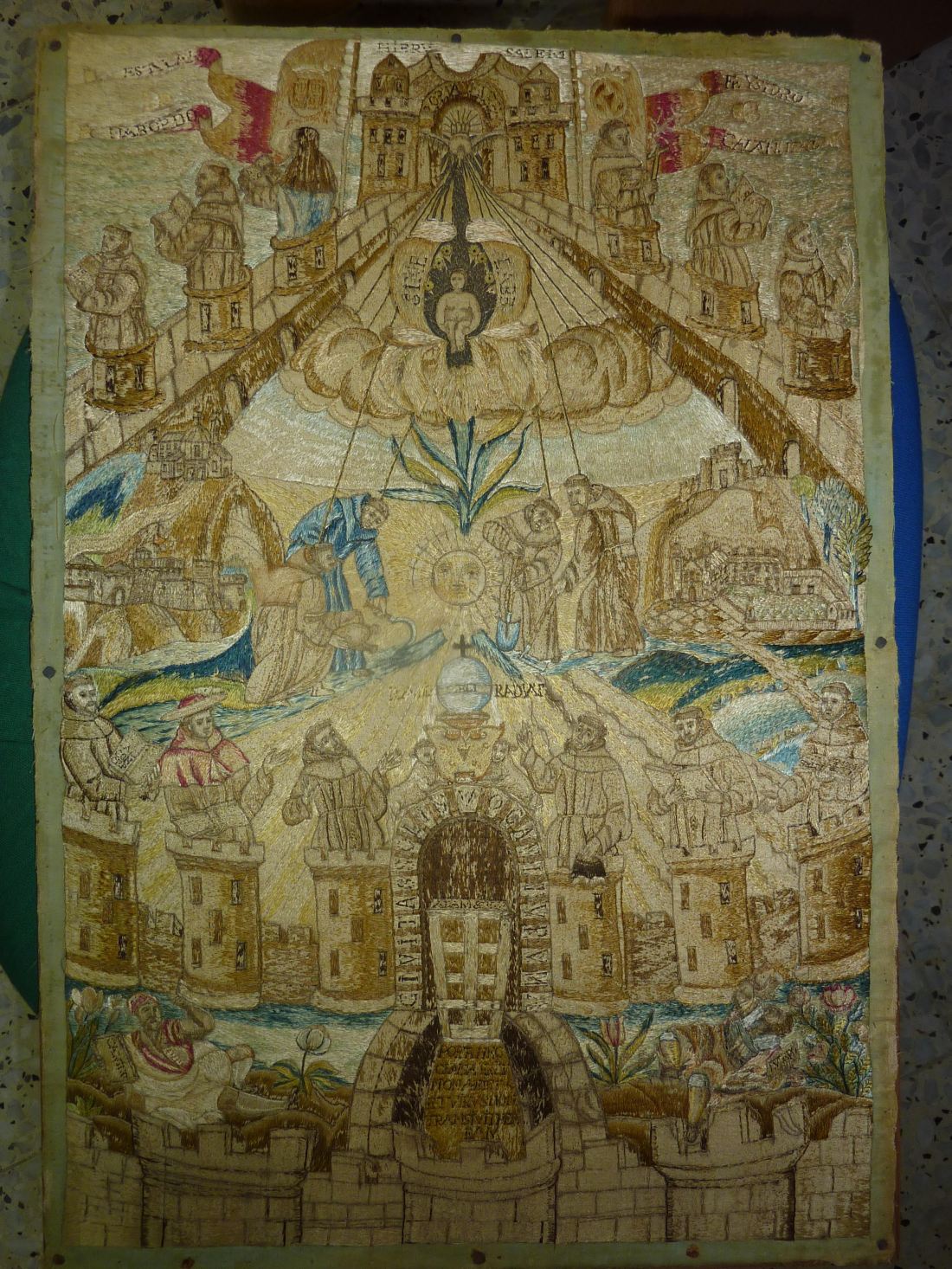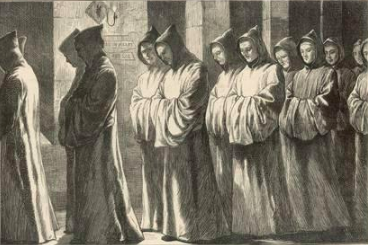Introduction
In the previous book we treated of the Mass, the Church, and her ministers, as much as God deigned to grant us. Now we shall speak whatever God inspires us to say about the remaining hours, as we have promised, beginning from Sunday night, the night on which we were redeemed out of slavery and borne from death into life.

Ch. 1
On the Office of Nocturnes
The night office represents the night watch of heaven’s citizens. For the Heavenly Jerusalem, which is built like a city (Psalm 121/122), is protected by the angelic vigil, who allot their turns in three vigils, dividing each into three hours, and each hour into three [orders], as without end they sing praises to the Trinity in sweet harmony with the infantry below. The present Church will one day enter that city and become mess-mates with its citizens, and for this reason she too is called Jerusalem and imitates the sentinels of that city in her vigils. In imitation of the members of that army, she does it at night, and on Sunday night because that is when she merited to join the company of the angels.

Therefore, this city is imaged in the basilica, where the clergy and people gather like an army for its military service. Trumpets give signals to soldiers and bells to Christians who like mustered soldiers salute their emperor when they begin praising Christ through the verse Domine, labia mea aperies. When they went to sleep at night, they protected themselves with the sign of the cross as with a seal, which now they open when they loose for God’s praise the mouths that were closed during the night. But since they keep watch in vain unless God guards the city (Psalm 126), they invoke the divine help through the verse Deus, in adiutorium meum.


The cantor who begins the invitatorium is the herald who summons the sentinels to their posts. After the psalm Venite, all sing a hymn, like soldiers who gather in camp to give honor to the king. Then they distribute the vigils among themselves when they sing the three nocturnes. Each vigil is divided into three hours, and there are three psalms in each nocturne. The angelic night guard does its rounds in three orders, corresponding to the nine orders of angels, and in our vigils we have the orders of psalms, readings, and responsories. In a similar way, the three nocturnes recall the soldiery of the whole Church, which has campaigned in the Lord’s service during three ages: before the Law, under the Law, and under grace.
Carthusians at Matins (Source)
Ch. 2
On the First Watch
The first watch stands for the time before the Law. It is assigned (so to speak) three hours of time by being divided into three parts.
The first hour of this vigil lasted from Adam to Noah, during which time the night watch of this city was served by Abel, Enos, Enoch, and Lamech, as the first psalms indicate. The Beatus vir (Psalm 1) portrays Abel, whose name means “tree,” since he bore the fruit of justice when he was struck down from among the men of this city. Quare fremuerunt (Psalm 2) proclaims Enos, who “served the Lord in fear,” and whom Scripture mentions as the first to call invoke the name of the Lord (Genesis 4). Domine, quid multiplicati (Psalm 3) signifies Enoch, whom the Lord took up to heaven (Genesis 5). Domine, ne in furore (Psalm 6) introduces Lamech. The Lord heard his prayer when he gave him a son who saved the human race in the ark from the wrath of God (Genesis 6, 9). These psalms are sung under one Gloria Patri because we believe that the just men of that age worshiped the Trinity. There are four, because these men shone out by the four virtues of prudence, fortitude, justice, and temperance. The antiphon signifies their praise of God.

In superiore libro de missa et Ecclesia, eiusque ministris, quae Dominus largiri dignatus est, digessimus; nunc de reliquis horis, quae rursus Dominus inspiraverit, dicamus, ut promisimus, et a Dominica nocte incipiamus, in qua redempti a servitute ad libertatem, de morte ad vitam translati sumus.
CAP. I. – De nocturnorum officio
Nocturnale itaque officium repraesentat nobis excubias supernorum civium: coelestis namque Hierusalem, quae aedificatur ut civitas, et conservatur per angelicas vigilias. Qui vices suas quasi in tres vigilias distribuunt, ac singulas tribus horis distinguunt, et unamquamque tribus ordinibus custodiunt, dum Trinitati in terrenis agminibus laudes dulcisono concentu iugiter concinunt. Et quia praesens Ecclesia in hanc civitatem, et in contubernium horum civium ventura praedicatur, ideo et ipsa Hierusalem nuncupatur, et idcirco illius civitatis vigiles in suis vigiliis imitatur: quia vero illius membra hic gerit, ideo hoc officium in nocte agit. Ideo autem in nocte Dominica, quia in hac meruit angelorum consortia.
Haec itaque urbs per basilicam figuratur, in qua clerus et populus quasi exercitus in militiam congregantur. Signa militibus per tubas dantur, Christianis signa per campanas dantur, qui quasi milites convenientes imperatorum salutant, dum per versum, Domine, labia mea aperies, laudes Christi inchoant. Dum enim in nocte dormitum eunt, signaculo crucis quasi sigillo se muniunt, qua nunc aperiunt, dum ora in nocte clausa ad laudem Dei solvunt. Sed quia frustra vigilant, nisi Dominus custodiat civitatem (Psal. CXXVI) per versum Deus, in adiutorium meum, divinum auxilium invocant.
Cantor, qui invitatorium inchoat, est praeco, qui tuba vigiles ad excubias convocat. Post psalmum Venite, hymnum omnes cantant, velut milites qui in castra conveniunt regem laudibus efferunt. Deinde vigilias inter se distribuunt, dum tres nocturnos psallunt. Singulae vigiliae tribus horis distinguuntur, et singulis nocturnis tres psalmi discernuntur. Angelicae excubiae tribus ordinibus servantur, et in nostris vigiliis ordines scilicet psalmorum, lectionum, responsoriorum denotantur. Quia coelestes excubiae per novem ordines angelorum celebrantur. Tres itaque nocturni, totius Ecclesiae militiam nobis commemorant, quae in castris Domini sub tribus temporibus videlicet ante legem, sub lege, et sub gratia militat.
CAP. II. – De prima vigilia.
Prima vigilia tempus ante legem intelligitur, quae quasi tribus horis ascribitur, dum tribus interstitiis distinguitur.
Prima vigilia quid significet.
Prima hora huius vigiliae ab Adam usque ad Noe erat, in qua excubias huius civitatis Abel, Enos, Enoch, Lamech servabant, sicut primi Psalmi indicant. Beatus vir (Psal. I) Abel exprimit, qui tanquam lignum interpretatur, quod fructum iustitiae protulit, dum ab hominibus huius urbis procubuit. Quare fremuerunt (Psal. II), Enos denuntiat, qui Domino in timore serviebat, quem Scriptura primum nomen Domini invocasse commemorat (Gen. IV). Domine, quid multiplicati (Psal. III), Enoch innuit, quem Dominus suscepit, dum eum de terrenis transtulit (Gen. V). Domine, ne in furore (Psal. 6), Lamech depromit, cuius deprecationem Dominus exaudivit, cum ei talem filium dedit, qui humanum genus a furore Domini in Arca servavit (Gen. VI, 9). Hi psalmi ideo sub una Gloria Patri canuntur, quia iusti illius temporis Trinitatem coluisse creduntur. Ideo autem quatuor psalluntur, quia quatuor virtutibus prudentia, fortitudine, iustitia, temperantia, fulsisse noscuntur. Antiphona, per quam modulantur, laudatio eorum in Deum notatur.